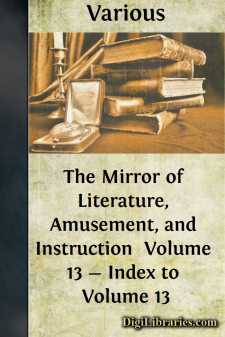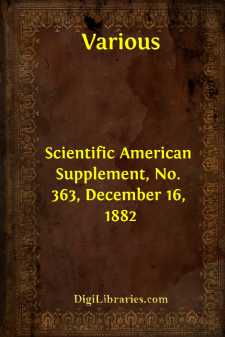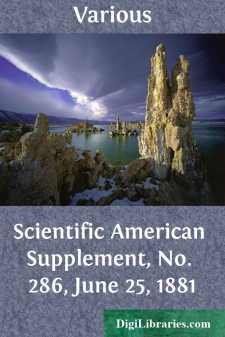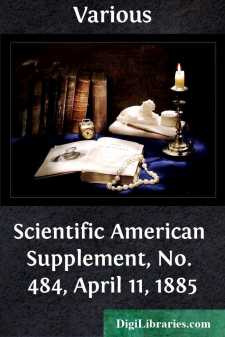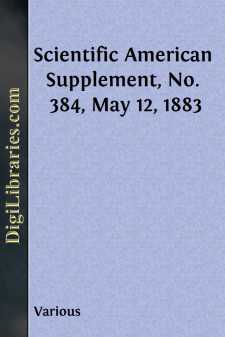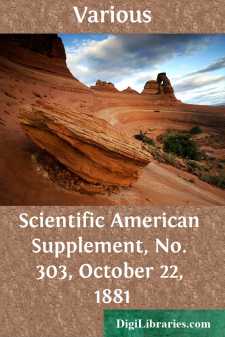Categories
- Antiques & Collectibles 13
- Architecture 36
- Art 48
- Bibles 22
- Biography & Autobiography 813
- Body, Mind & Spirit 142
- Business & Economics 28
- Children's Books 14
- Children's Fiction 11
- Computers 4
- Cooking 94
- Crafts & Hobbies 4
- Drama 346
- Education 46
- Family & Relationships 57
- Fiction 11828
- Games 19
- Gardening 17
- Health & Fitness 34
- History 1377
- House & Home 1
- Humor 147
- Juvenile Fiction 1873
- Juvenile Nonfiction 202
- Language Arts & Disciplines 88
- Law 16
- Literary Collections 686
- Literary Criticism 179
- Mathematics 13
- Medical 41
- Music 40
- Nature 179
- Non-Classifiable 1768
- Performing Arts 7
- Periodicals 1453
- Philosophy 64
- Photography 2
- Poetry 896
- Political Science 203
- Psychology 42
- Reference 154
- Religion 513
- Science 126
- Self-Help 84
- Social Science 81
- Sports & Recreation 34
- Study Aids 3
- Technology & Engineering 59
- Transportation 23
- Travel 463
- True Crime 29
The Mirror of Literature, Amusement, and Instruction Volume 13 - Index to Volume 13
by: Various
Categories:
Description:
Excerpt
MEMOIR OF SIR HUMPHRY DAVY, BART.
The present may be regarded as a chemical age; for so extensive, rapid, and important have been the late acquisitions in the science of chemistry, that we may almost claim it as the exclusive discovery of our own times. The popularity and high estimation in which it is held may be ascribed to three causes: 1. The satisfaction which is afforded by its results. 2. Its utility in all the arts of life. 3. The little previous preparation which an entrance on its study requires. To these may be added, the new interest conferred upon the science by the discoveries of Black, Priestly, and Lavoisier, which had already introduced into chemical science the long-neglected requisites of close investigation and logical deduction; but it was reserved for Sir HUMPHRY DAVY to demonstrate the vast superiority of modern principles, by the most brilliant career of discovery, which, since the days of Newton, have graced the annals of science.
Sir Humphry Davy was born December 17, 1779, at Penzance, in Cornwall. His family was ancient, and above the middle class; his paternal great grandfather had considerable landed property in the parish of Budgwin, and his father possessed a small paternal estate opposite St. Michael's Mount, called Farfal, on which he died in 1795, after having injured his fortune by expending considerable sums in attempting agricultural improvements. Sir Humphry received the first rudiments of his education at the grammar-schools of Penzance and Truro: at the former place, he resided with Mr. John Tomkin, surgeon, a benevolent and intelligent man, who had been intimately connected with his maternal grandfather, and treated him with a degree of kindness little less than paternal. His genius was originally inclined to poetry; and there are many natives of Penzance who remember his poems and verses, written at the early age of nine years. He cultivated this bias till his fifteenth year, when he became the pupil of Mr. (since Dr.) Borlase, of Penzance, an ingenious surgeon, intending to prepare himself for graduating as a physician at Edinburgh. As a proof of his uncommon mind, at this early age, it is worthy of mention, that Mr. Davy laid down for himself a plan of education, which embraced the circle of the sciences. By his eighteenth year he had acquired the rudiments of botany, anatomy, and physiology, the simpler mathematics, metaphysics, natural philosophy, and chemistry. But chemistry soon arrested his whole attention. Having made some experiments on the air disengaged by sea-weeds from the water of the ocean, which convinced him that these vegetables performed the same part in purifying the air dissolved in water which land-vegetables act in the atmosphere; he communicated them to Dr. Beddoes, who had at that time circulated proposals for publishing a journal of philosophical contributions from the West of England. This produced a correspondence between Dr. Beddoes and Mr. Davy, in which the Doctor proposed, that Mr. Davy, who was at this time only nineteen years of age, should suspend his plan of going to Edinburgh, and take a part in experiments which were then about to be instituted at Bristol, for investigating the medical powers of factitious airs; to this proposal Mr....


